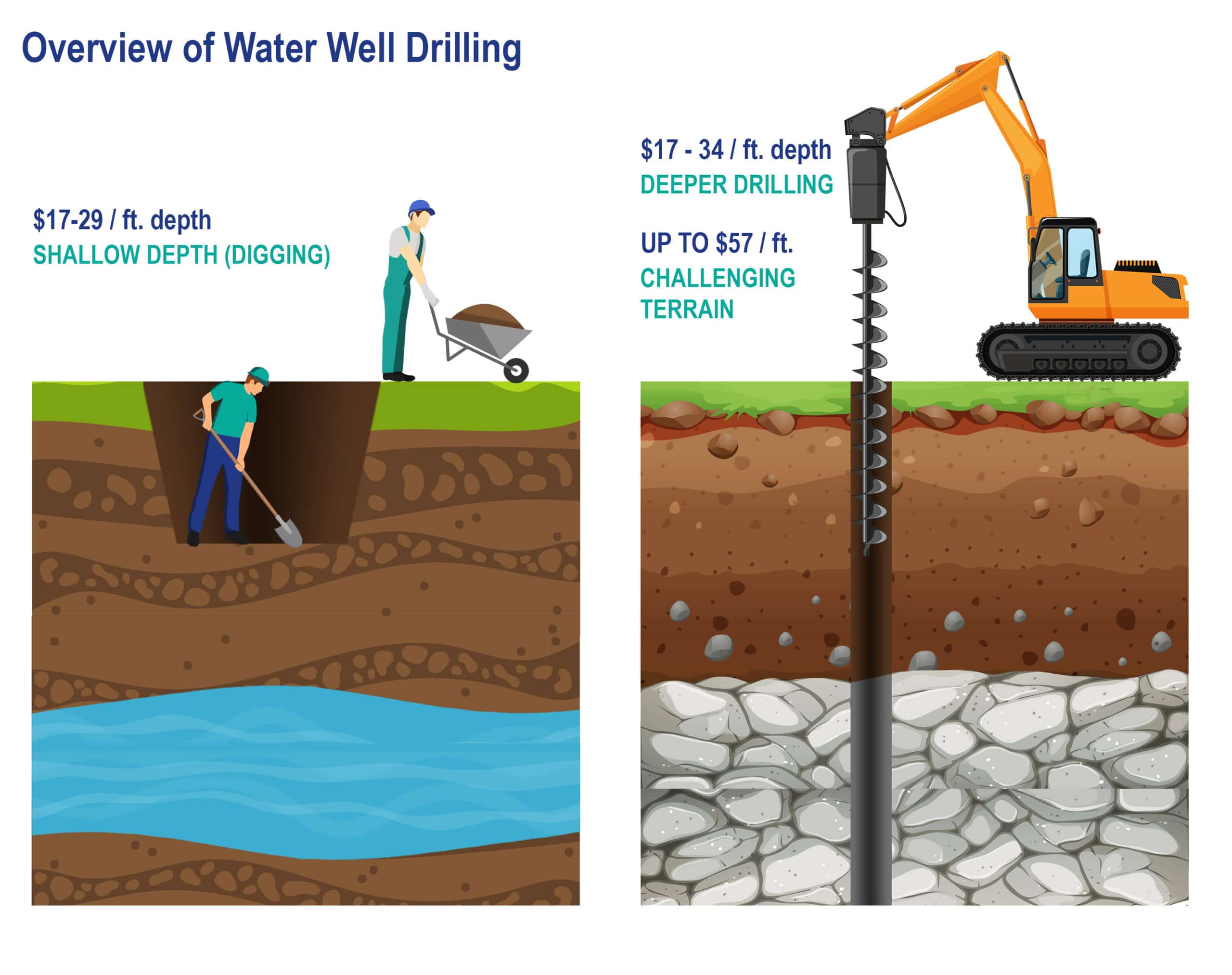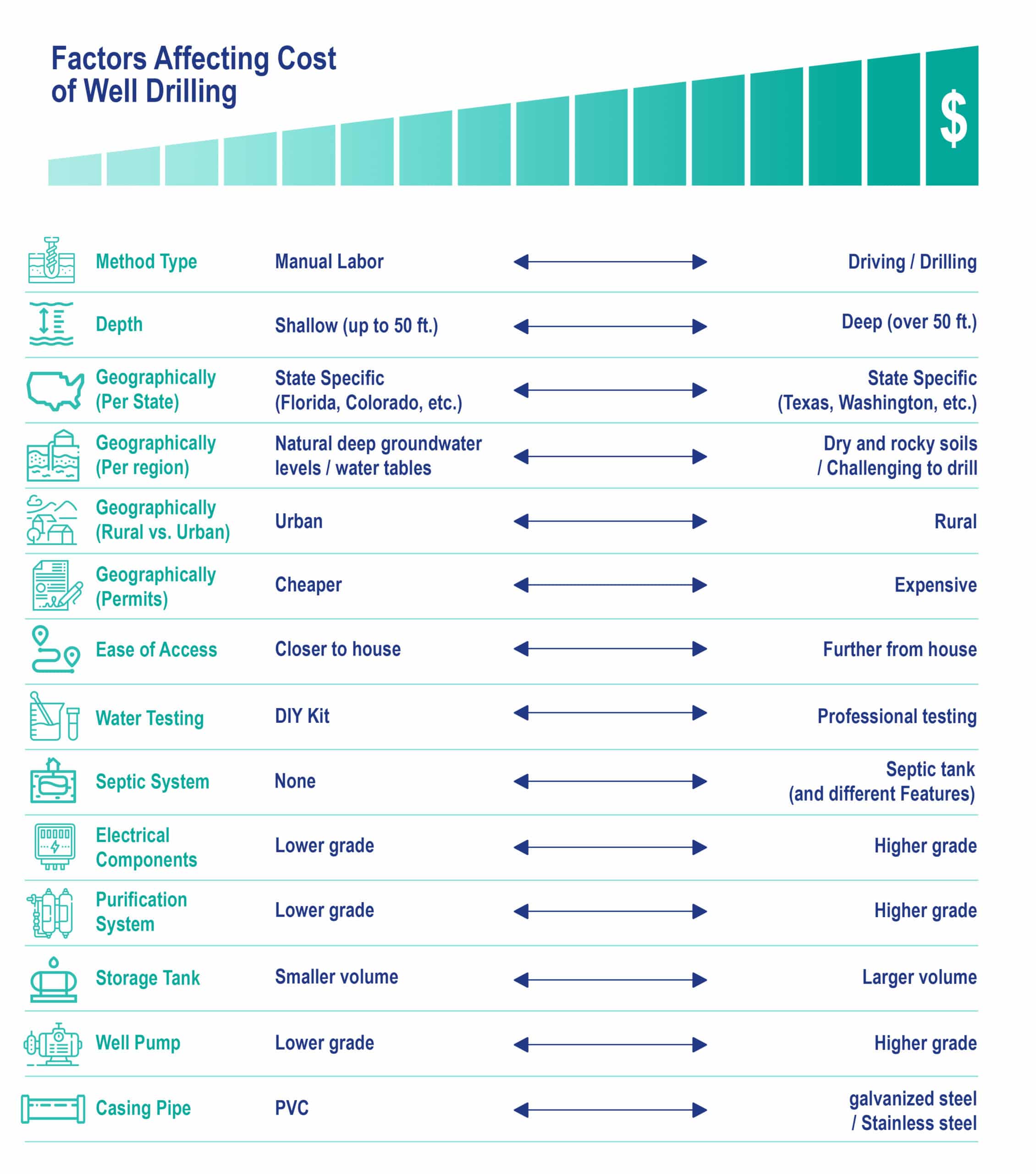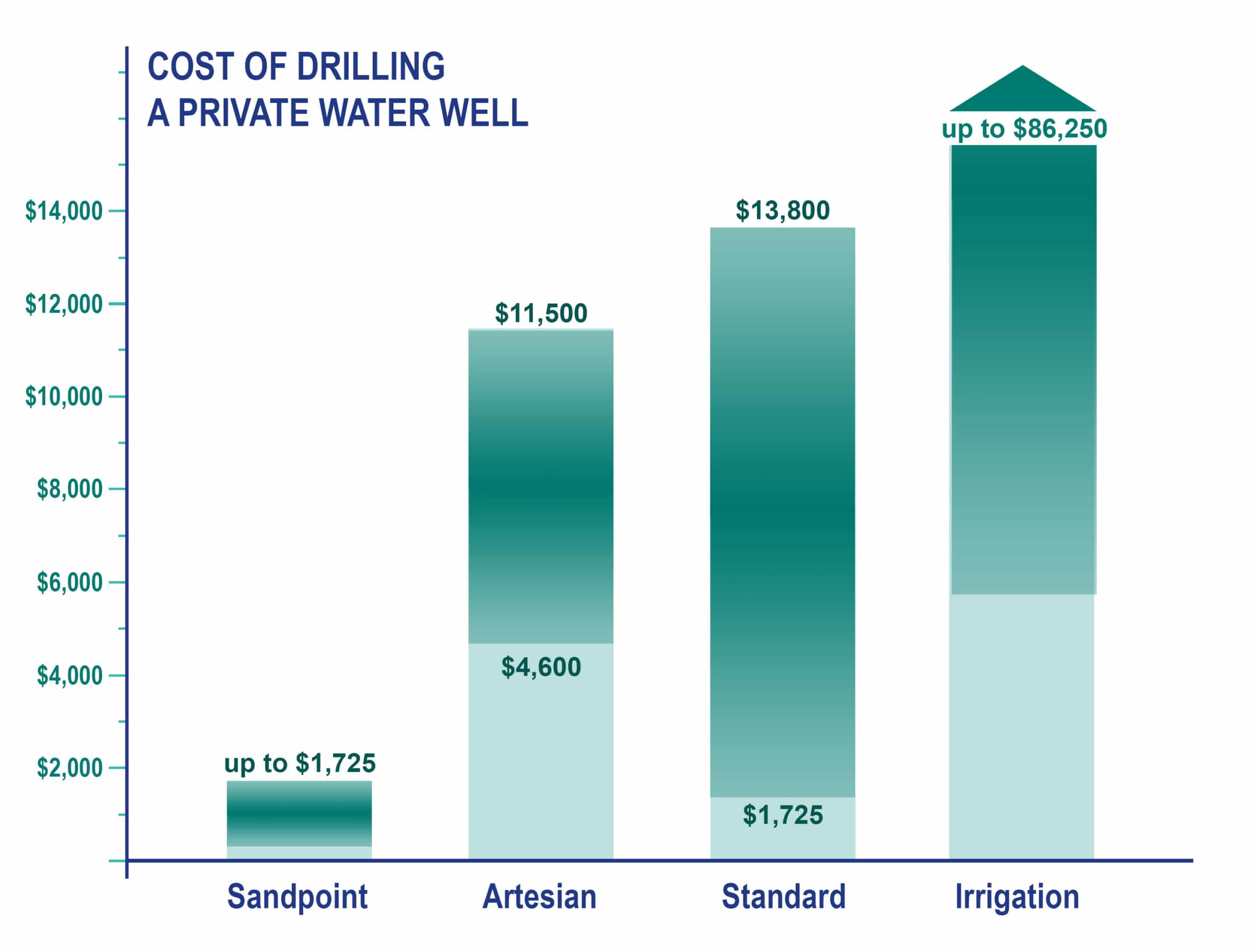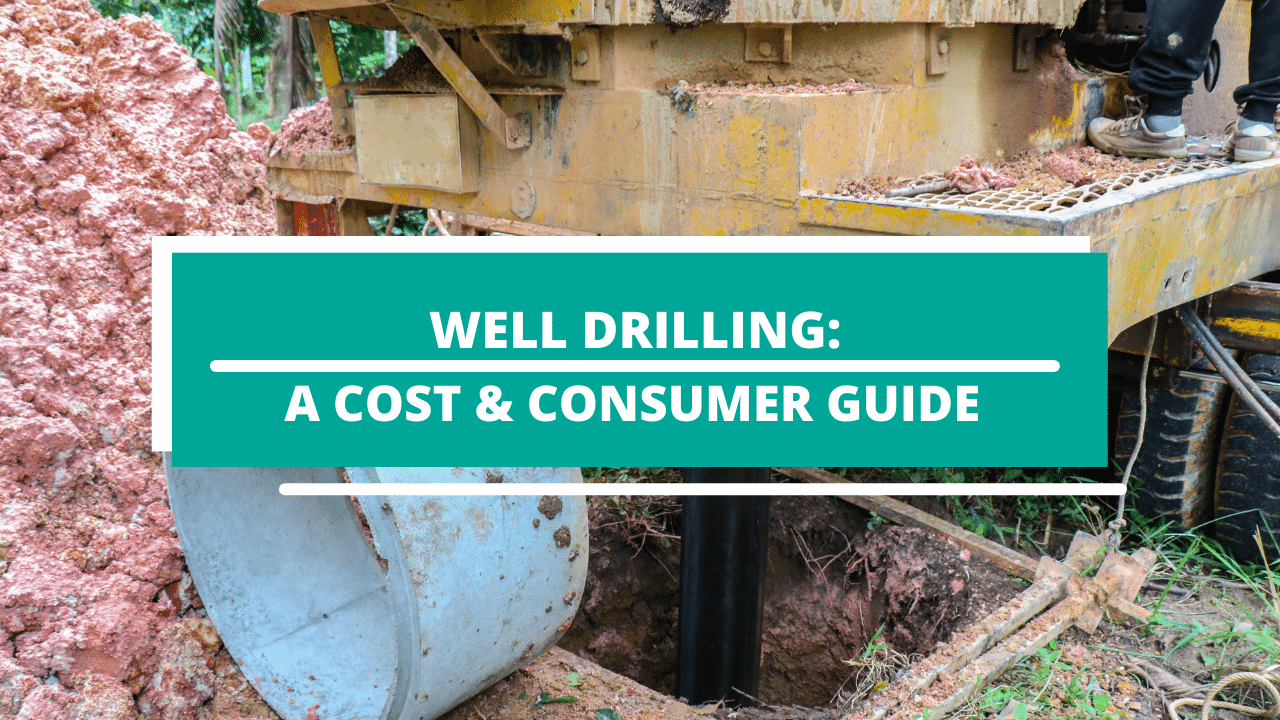Today, private wells aren't only ideal for households located in rural areas or properties out of municipal services. More homeowners are opting to install a private well in their backyards. Over 43 million Americans rely on domestic wells for their water supply as of writing. That's roughly around 15 percent of the total population, according to the United States Geological Survey.
You may be wondering, what are the benefits of installing a well at home? For one, a private well enables you to sustain your drinking water source independently. It will also reduce your water bills, helping you save a couple of hundreds per year. You will also have cleaner, better-tasting water since this natural water source is not treated with chemicals like chlorine.
Now, if you're starting to consider a domestic well for your water supply– this cost guide will go over everything you need to know. Read on as we'll answer some of your pressing questions, such as "How much does it cost to drill a well?" or "How can I install a residential well that fits my budget?"
Well Drilling Cost Overview
The average cost of drilling a well runs at $6,325 for a standard 150 feet depth. For a broader estimate, most homeowners spend around $1,725 to $13,800 for well installation costs. It falls at $17 to $34 per foot of depth and up to 57 for challenging terrains. For shallow depth, digging may suffice, which runs for $11 to $29 per foot.

Keep in mind that the total costs for a great well drilling project may vary, as it depends on several factors: depth, soil conditions, and size in diameter. Unlike other home improvement projects, you will benefit better if you leave the process to experienced professionals. Consider hiring reputable well drilling contractors in your area to keep your property safe from damage, as well as protecting the occupants in your house from any harm. Contractors will also handle all permits you need to get started with your highly-anticipated project.
Cost per Scale: Well Drilling on Different Budgets
Homeowners have different set budgets when it comes to residential well drilling projects. Here's a quick overview covering various price points if you're curious about where your budget will get you.

Some homeowners may also consider installing a heater, either water, solar, or tankless. Note that this may cost you an additional $805 to $5,750 to the total cost to drill a new well.
Factors Affecting Well Drilling Cost
The range between $1,725 and $13,800 for well drilling cost depends on different factors. In particular, you will need to consider the depth and location of your private well, its distance from the home, relevant permits, and water testing.
Here are some other factors of a water well drilling cost beyond the upfront expenses.

Method Type
The average cost to drill a well depends on your chosen method. Generally, there are three methods you can choose from in reaching groundwater: drilling, driving, or digging. Dug wells are considered the most cost-effective option starting at $2,500. These can be either dug by hand, which can be labor-intensive, or with the use of appropriate equipment.
Note that you can only choose the digging route if the water table in your property is less than 50 feet in depth. Meanwhile, driven wells start at $4,000. These wells are built with a smaller diameter than drilled wells, which will cost you a minimum of $5,500. Fortunately, your contractor can help determine the best method for your home situation.
Depth
In determining the cost to drill a new well, you will need to consider its depth– either you need a deep one or a shallow well. Many contractor averages will heavily depend on the depth, with most projects ranging from 100 to 400 feet. However, if groundwater is near the surface, a well with a 25-foot depth may suffice in some cases.
Keep in mind that every additional foot needed to reach groundwater will add to the total project costs. If the cost of well drilling per foot runs at $40, installing a 200-feet private well will be at approximately $8,000. In some areas, local authorities may impose regulations for minimum well depth. It's best to talk to your contractor to determine an ideal depth for your needs.
Geographic Location
Soil quality, which is often influenced by your property's geographic location, can increase the cost of well drilling. In some cases, it may get up to $57 per foot. Low water levels will need deeper dug holes, which may also hike up the prices further.
Permits
Depending on your locality, the required permit fees may vary. We'll place a rough estimate starting at $5.7 to $575 for this. Keep in mind that some permits are required by law– and if you skip them, you may end up facing legal repercussions. One benefit of hiring professional contractors is how they can assist in securing all the needed permits and necessary paperwork.
Some areas require homeowners to secure multiple permits for a well drilling project, including a plumbing permit. Note that the fees for irrigation and residential permits may also vary in different locations.
Ease of Access
The closer you drill or dig an area to your home, the more savings you can expect when it comes to the cost of well drilling. How does this apply, you may ask? For starters, the waterline and required electric supply lines will be shorter. That said, every foot the well is closer to your home, you can save around $57 to $173 for the pipes.
Water Testing
Before you consider installing a well at home, an important aspect to cover is professional water quality testing at approximately $115 to $575.
If you want to trim down some costs, you may also buy a DIY water testing kit for $34 to $173. This process will ensure your well water is safe and clean for consumption. Usually, the first 100 gallons of water are filled with mud. You will need to ensure no bacteria lingers in the water before you drink it. Several well drilling companies already include a water quality inspection for their initial site visit.
Well and Septic System Installation
If you're planning to live off the grid, you may want to install a septic system along with your well. It will cost an additional $3,565 to $11,730, depending on several factors. Perhaps two of the most defining price factors will be the addition of an underground tank as well as a soil absorption system.
While a well will provide you with a clean water supply, a septic system is necessary to properly dispose of all the wastewater.
Private Well vs. Municipal Water System
Although the upfront costs are a bit more expensive, a private well can offer the best return on investment in the long run. You will only need to pay for the pump operation electricity costs in a month. There's also annual maintenance at $115 to $287.
Accordingly, your utility costs will be more stable. You can enjoy up to 12,000 gallons of water every month. Having a private well, then, can help you save $575 annually. Wells of old age will have more necessary upkeep. Most homeowners spend approximately $11,500 in 20 to 30 years of keeping a domestic well for a water tank or pump replacement and other repairs.
Electrical Components
A water well system typically comprises several electrical parts. These help in tank pressure control and water regulation for your home. On average, these will cost you somewhere between $57 and $172.
Purification System
Most domestic wells rely on a reverse osmosis system for water purification, making it safe for daily consumption. These systems will cost you from $690 to $2,760.
Storage Tank
Your well will need a storage tank to hold the clean water until you need it for storage purposes.
The price will vary depending on the tank size, with the smallest at 50 gallons to large-scale tanks at 500 gallons and more. Expect these storage tanks to cost you $575 to $2,300.
Well Pump
The primary function of a good pump is to extract the water from below the ground to transfer it into your home. It is considered one of the essential parts of domestic water well, with units ranging between $345 and $1,380.
Given that it is one crucial piece to the system, it's best to acquaint yourself with the nearest repair service options in your area.
Casing Pipe
A casing pipe is necessary to prevent any loose soil or rock from collapsing the well. It serves as adequate wall support. Most PVC pipe casing options are affordable at around $6 to $10 per foot. For stainless or galvanized steel pipes, you may spend about $38 to $115 per foot.
Well Drilling & Digging Costs
The cost of well-digging per foot is at $11 to $29 on average. Meanwhile, drilling adds an extra $17 to $34 to the total expenses. These estimated price points only cover the digging and drilling process. If your project needs extended labor or special equipment, it is best to prepare your budget accordingly.
Digging is a standard method for wells with shallow depths since the hole does not need further soil penetration. Wells that reach 100 feet and more need drilling to pass through rugged terrain and rocky soil. Let’s talk about the different well drilling options you can take into consideration.

Components & New System Installation
The well drilling cost range of $1,725 to $13,800 will be easier to understand if you divide it into components. Keep in mind that drilling is only one step of the process. There are subsequent steps to follow before the project is complete. For your reference, here's a quick overview of the cost estimates (including the material cost and labor) of a private water well:
Material/Appliance | Average Costs |
|---|---|
Well Pumps | $172 - $1,610 |
Casing Pipe | $955 - $3,220 |
Pressure Switch and Electrical Wiring | $241 - $747 |
Pressure Storage Tank | $1,840 - $3,335 |
Water Treatment and Purification System | $1,150 - $3,220 |
Water Heater | $1,150 - $1,920 |
Irrigation Water Well
The cost to drill a new well for agricultural projects will be more expensive than residential irrigation. Expect large-scale, commercial drilling projects to cost up to $86,250.
Below are some price factors included in general irrigation water well:
Material/Appliance | Average Costs |
|---|---|
Well Pump | $402 - $1,610 |
Casing Pipe | $954 - $3,450 |
Pressure Switch and Electrical Wiring | $241 - $747 |
Pressure Storage Tank | $1,840 - $3,335 |
Note that a treatment system is only ideal in areas with low water quality. You can also skip buying a heater.
Artesian Well
Generally, an artesian well option runs from $4,600 and $11,500 in total well drilling expenses. The process will be more complicated than the other options as well. But, you will not require electricity in drawing the water.
Material/Appliance | Average Costs |
|---|---|
Pressure Storage Tank | $1,840 - $3,335 |
Casing Pipe | $954 - $3,450 |
Water Treatment (Purification) | $1,150 - $3,450 |
Water Heater | $1,150 - $6,693 |
Sand Point Well
At $230 to $1,725, a sand point option is a great alternative to consider if you're working with a limited budget. Do note that this hand-operated system may be unreliable at times, though.
Still, it's an excellent choice for intermittent well usage instead of relying on your domestic well for consistent water supply or commercial irrigation purposes.
Material/Appliance | Average Costs |
|---|---|
Hand Pump | $230 - $747 |
Small Water Tank | $977 - $2,116 |
The small water tank is only an optional addition since several homeowners use it to water their plants and do other gardening-related activities.
Benefits of Water Well Drilling
If you’re still undecided on having a water well installed at home, here are some benefits to consider:
Tips on Where to Dig a Well in Your Home
At this point, you may be so close to finalizing your residential water well project. Before signing with a local contractor, here are some tips to help you determine the most optimal area in your property for well digging.
Should I Hire a Well Drilling Professional?
Although it is possible to drill a well on your own, provided you have enough time for labor and all necessary equipment– the costs may quickly add up beyond your budget.
We’re talking drill rental, pump, water tank, and permits. Not to mention, an improper installation may only compromise the safety of all occupants of your property. With that in mind, it would be a better choice to hire a well-drilling expert to make the most bang out of your buck. You can count on their experience to ensure proper drilling and installation.
It’s the best route if you want a guaranteed ROI for your well-drilling project.
Well Drilling: Frequently Asked Questions (FAQs)
How long does a well-drilling installation take?
Well drilling installation typically lasts for about a week. With proper care and maintenance, it will last for up to 40 years.
What are the dimensions of standard water well?
The typical residential water well typically has a 4" to 6" diameter of 100 to 300 feet deep.
How do I determine if my well is running dry?
Some telling signs that your water well is drying up are if the tap water is looking muddy, significant change in water taste, the air coming through the system, and fixtures begin to sputter.
How to tell if my well is too old?
A well's life expectancy is estimated to last between 20 and 40 years. Because of silt or mineral scale build-up, yield may decrease with time. However, for some homeowners, a well can live much longer than this lifespan.
Conclusion
Drilling a well or improving your old, existing well and pump system at home are excellent home improvement projects to consider. Water well drilling costs will vary depending on the scope of your project, ease of access, and other influential variables. Pay importance to the expertise of your chosen local contractor and the quality of the materials used. Doing so will help you ensure the well-drilling project will go as smoothly as planned.
For your well-drilling needs, it's best to hire professionals to get the job done. Trust us, it will save you more money from frequent, costly repairs in the long run.

